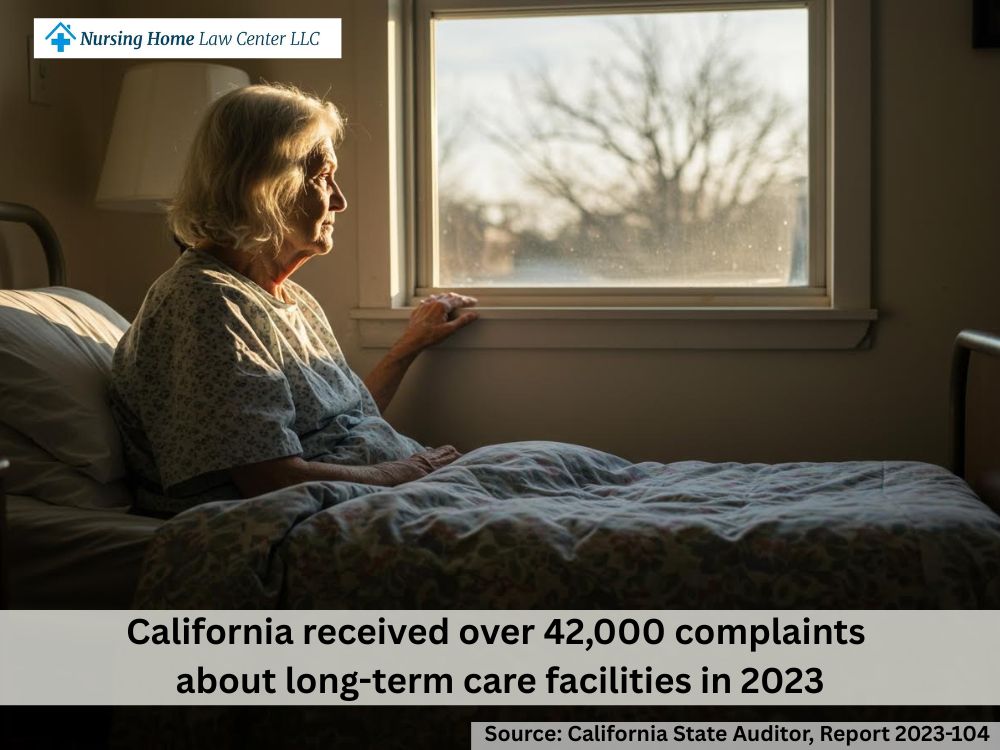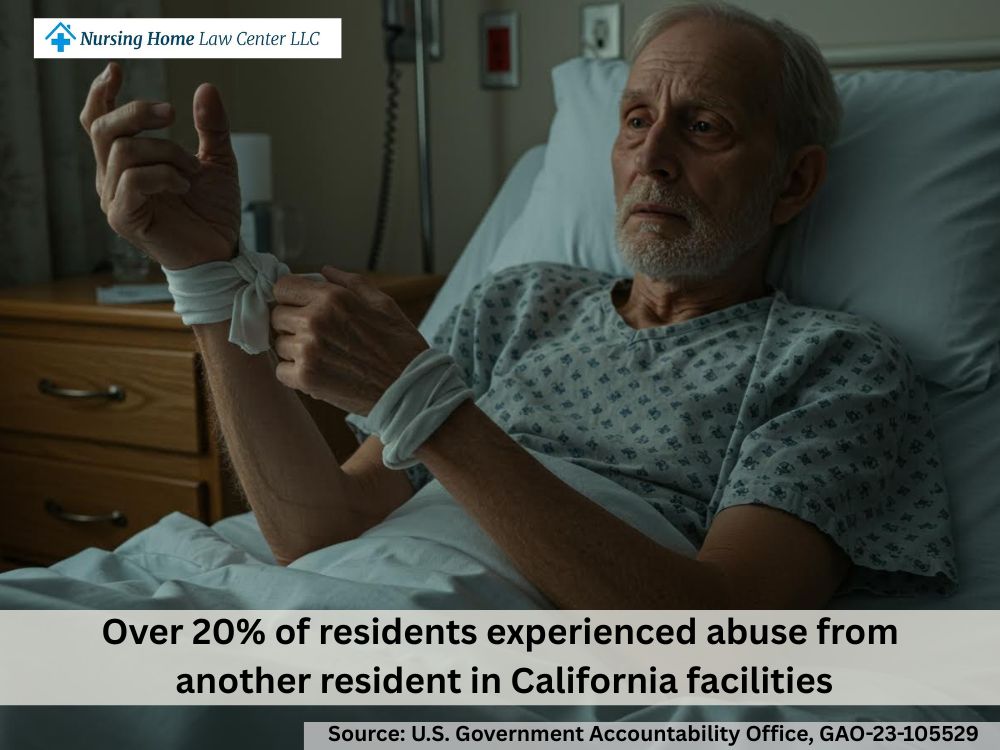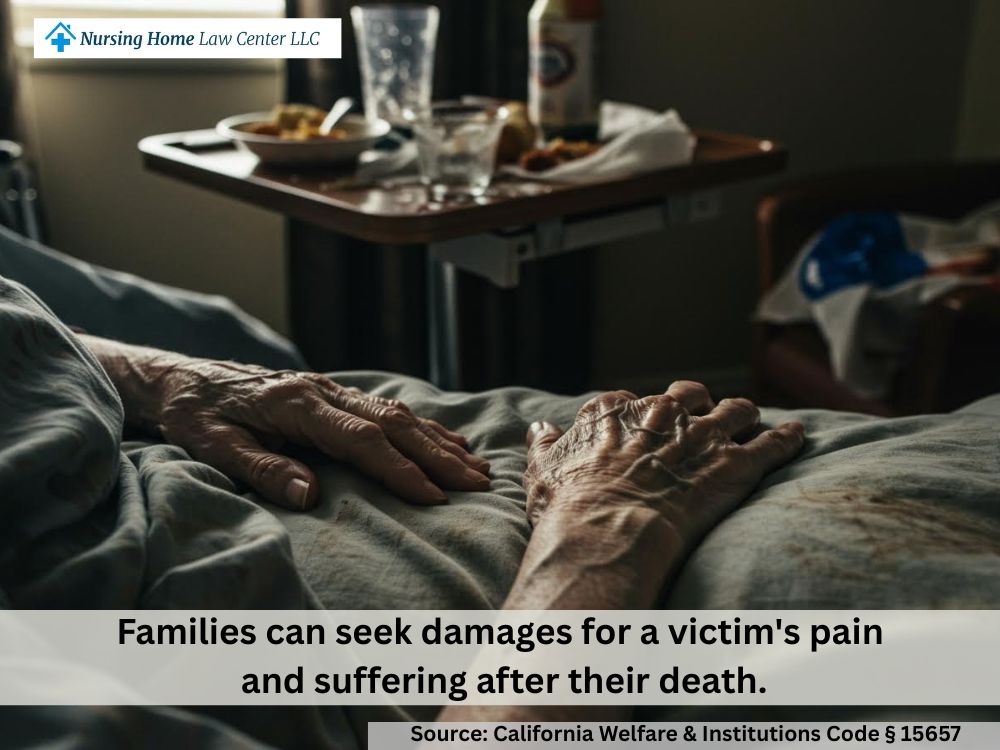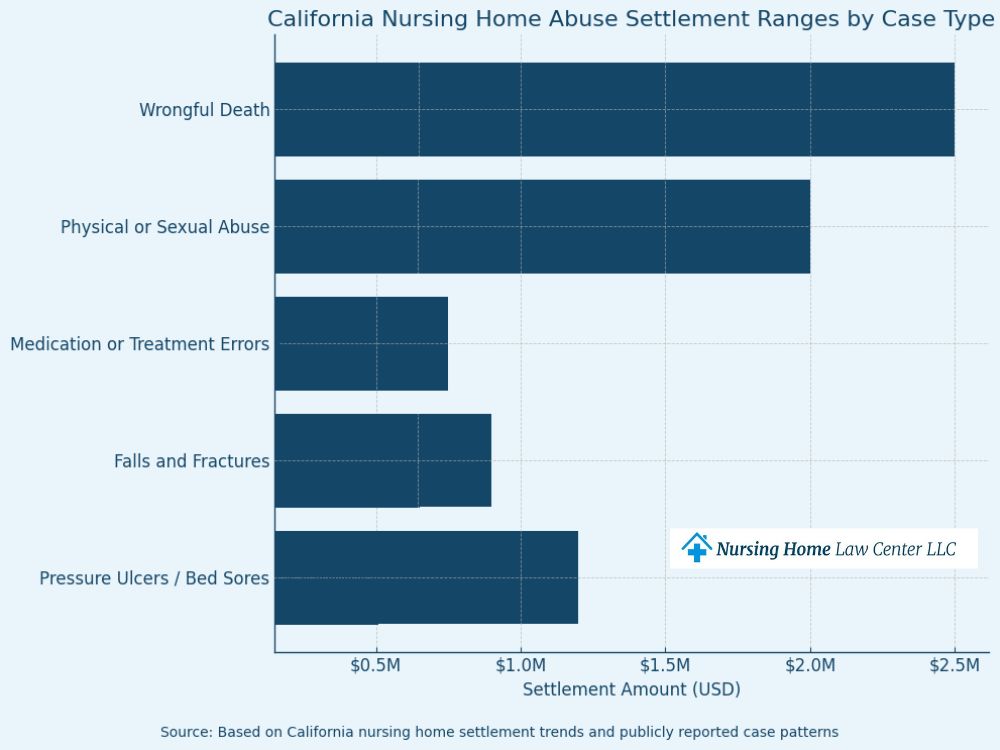The Nursing Home Law Center is committed to providing the legal resources necessary to hold negligent facilities accountable.
California Nursing Home Abuse Lawsuit Settlements
When your loved one has suffered abuse or neglect in a care facility, California nursing home abuse lawsuit settlements can offer a way to seek justice. At Nursing Home Law Center, we stand with families across the state who are facing the painful impact of nursing home abuse and neglect.
Our law firm focuses exclusively on nursing home abuse cases, helping family members hold responsible parties accountable and pursue the compensation they deserve. You don’t have to face this alone. We’re here to help you every step of the legal process.

Settlement and Verdicts Recovered by Our Nursing Home Abuse Lawyers
Our California nursing home abuse lawyers have recovered millions for victims of nursing home abuse and neglect across the state.
- $1,500,000 Settlement – Elaine, an elderly woman with dementia, died after ingesting industrial cleaner she accessed from an unlocked storage closet. Staff failed to monitor her or secure hazardous materials. Her family pursued a nursing home abuse lawsuit. Factors considered in the nursing home abuse settlement included the facility’s prior safety violations and the evident medical neglect that led to her death.
- $1,500,000 Settlement – Thomas, a 62-year-old man with developmental disabilities, was attacked multiple times by another resident while staff looked the other way. The abuse left him with deteriorated mental health and visible physical injuries. This California nursing home settlement reflects the home’s history of ignoring violent behavior and failing to intervene.
- $1,250,000 Settlement – Margaret, a 79-year-old stroke survivor, died after choking on solid food. Her care plan specifically required a soft diet due to swallowing issues, yet staff served her unmodified meals without supervision. Key evidence considered in the nursing home wrongful death settlement included medical records, staff reports, and expert findings showing a pattern of medical negligence.
- $1,200,000 Settlement – Carol, a disabled resident, suffered spinal damage in a transport van accident after staff failed to secure her wheelchair properly. The incident left her needing long-term medical treatment, including physical therapy and occupational therapy. Her nursing home negligence settlement covered medical expenses, ongoing care, and the physical pain she experienced during recovery.
What Types of Financial Compensation Can Be Recovered Through a Nursing Home Neglect Settlement?
When a nursing home resident suffers harm, a nursing home neglect settlement can provide financial relief for the costs and hardships that follow. These settlements help families recover from the emotional and financial impact of nursing home abuse or neglect. Depending on the case, compensation may cover several categories of losses.
Medical Expenses
California nursing home abuse lawsuit settlements often include the cost of medical treatment needed after the injury or illness caused by neglect. This may involve hospitalization, surgery, physical therapy, occupational therapy, medications, and long-term care.
In nursing home abuse cases, accurate records are essential for documenting the harm and proving the connection between the facility’s actions and the medical costs involved.
Emotional Distress
Many nursing home abuse lawsuits involve claims for emotional distress, especially in cases involving emotional, physical, or sexual abuse. Residents may experience fear, anxiety, depression, or trauma as a result of being mistreated. Family members can also suffer from the emotional impact of witnessing a loved one endure abuse or neglect. These non-economic damages are a key part of any fair settlement.
Relocation Costs
When a resident has suffered abuse or severe neglect, families often choose to move them to a safer facility. The cost of relocating to a new skilled nursing facility or assisted living facility can be significant. A nursing home abuse settlement can help cover moving expenses, new admission fees, and even costs related to temporary care while transitioning.

What Is the Average Settlement for Nursing Home Abuse and Neglect in California?
According to Law.com’s VerdichSearch, the average nursing home abuse settlement is approximately $2.36 million, while the median payout is $750,000. The full range of compensation stretches from $57,585 to over $30 million, reflecting the differences between individual nursing home abuse lawsuits.
Several factors affect nursing home settlement amounts:
- Extent of harm – Cases involving serious injuries, permanent disability, or severe emotional distress tend to result in higher compensation.
- Type of abuse or neglect – Sexual abuse and medical neglect often carry greater liability than minor neglect or isolated mistakes.
- Strength of evidence – Thorough medical records, facility incident reports, and documented care violations can increase the likelihood of a higher nursing home settlement.
- County or court venue – Places like Los Angeles County, where these claims are most commonly filed, may yield larger verdicts based on local jury behavior and cost of living.
- Resident impact – The degree to which the nursing home resident suffered–physically, emotionally, and financially–will influence the final settlement amount.
While many nursing home abuse claims are resolved through settlements, others may go to trial, where juries can award larger sums. An experienced nursing home neglect lawyer can help you evaluate the facts of your case and determine what level of financial compensation might be appropriate.
Example Nursing Home Abuse Cases
$30.9 Million Verdict – Pressure Sore Wrongful Death at Sacramento Nursing Home
Sam Rios Jr., 85, developed two unstageable heel pressure sores during a two-week stay at Pine Creek Care Center in Roseville. One wound progressed to a Stage IV ulcer, causing nearly a year of conscious pain and suffering before his death. His family filed a wrongful death lawsuit against multiple corporate entities, alleging nursing home neglect, understaffing, and profit-driven care failures.
The jury awarded $30,912,802, including medical expenses, punitive damages, and damages for pre-death suffering. This case stands as one of the largest California nursing home abuse lawsuit settlements and a warning to for-profit facility chains.
$29.1 Million Verdict – Fatal Bed Sore After Hip Fracture in California Facility
Frances Tanner, 79, fractured her hip in a fall at Colonial Healthcare and later died from an infected pressure sore. Her daughter sued the nursing home and its corporate parent, claiming that Tanner wasn’t regularly repositioned, her hip fracture went untreated for days, and the facility was dangerously understaffed.
The jury agreed, awarding $29.1 million, including $28 million in punitive damages and $800,000 for her pain and suffering.
$25.8 Million Verdict – Amputation from Stage IV Pressure Sore in Los Angeles Facility
Kenneth Morris, a 58-year-old resident with multiple medical conditions, developed a heel wound at Western Convalescent Hospital that worsened into a Stage IV ulcer. Neglected for months, the sore became infected and eventually required a below-the-knee amputation. His nursing home abuse lawsuit alleged understaffing, lack of training, and failure to follow basic preventive care.
The jury awarded $25.8 million, including medical costs, pain and suffering, and $13 million in punitive damages. The verdict held both the facility and its corporate manager accountable for intentional nursing home neglect and financial exploitation of care budgets.
$10.2 Million Verdict – Teen’s Wrongful Death from Seizure in Group Home
Kevin Barr, a 15-year-old with cerebral palsy and epilepsy, died after staff at Lonika’s Home failed to administer seizure medication and delayed calling 911. His parents alleged wrongful death, neglect, and a cover-up, including the destruction of medical records.
The jury found willful misconduct and fraud, awarding $10.2 million, which included $4.5 million in punitive damages. The nursing home litigation revealed serious violations in staff training and care protocols.

What Types of Elder Abuse or Neglect Can Be Grounds for a Nursing Home Lawsuit?
Whether caused by direct mistreatment or failures in care, certain forms of abuse and neglect create valid grounds for legal action.
Physical Abuse
Physical abuse includes any intentional act that causes bodily harm to a resident, such as hitting, pushing, rough handling, or excessive use of restraints. These incidents may lead to bruises, fractures, or internal injuries.
Families who suspect abuse of this type can pursue a nursing home abuse claim to recover medical bills and compensation for physical pain and suffering. Staff, visitors, or even other residents may be held liable through a nursing home lawsuit.
Emotional Abuse
Emotional abuse is often hidden but just as damaging. It includes yelling, threats, name-calling, manipulation, or isolating a resident from others. Over time, this type of mistreatment can lead to depression, withdrawal, fear, and confusion.
If a loved one begins to act differently or avoids certain staff, it may be a warning sign. A nursing home abuse lawyer can help file a claim seeking damages for emotional trauma and deterioration in the resident’s mental health.
Financial Abuse
Financial abuse involves the unauthorized use or theft of a resident’s money, benefits, or assets. It may show up as missing bank funds, unexplained charges, or suspicious changes to wills or financial documents. Older adults—especially those with cognitive decline—are particularly vulnerable.
These nursing home abuse cases may involve both civil and criminal consequences. Victims and families can pursue financial compensation through a nursing home lawsuit settlement to recover stolen assets and related emotional harm.
Sexual Abuse
Few things are more devastating than discovering a loved one was the victim of sexual abuse in a nursing home. This includes any unwanted sexual contact, touching, or coercion. Victims may be unable to speak for themselves due to medical conditions, making signs like fear, physical injuries, or sudden withdrawal red flags.
Facilities can be held liable for poor hiring, supervision, or ignoring complaints. These cases often lead to some of the highest nursing home settlements in California.
Neglect
Neglect happens when staff fail to meet a resident’s basic care needs–whether due to lack of attention, poor training, or intentional disregard. Common signs include bedsores, infections, missed medications, dehydration, or poor hygiene.
These incidents often lead to unnecessary suffering and can escalate to serious complications or hospitalization. Filing a nursing home neglect claim can help cover medical bills, relocation expenses, and the cost of recovery. In many nursing home abuse lawsuits, neglect is at the heart of the case.
Wrongful Death
When nursing home abuse or medical negligence leads to a resident’s death, the family may be entitled to file a nursing home wrongful death lawsuit. These cases often involve fatal infections, falls, untreated wounds, or failure to provide proper medical treatment.
Surviving family members may recover funeral and burial costs, compensation for emotional pain, and damages for the resident’s suffering before death. Some wrongful death settlements in California nursing homes also include punitive damages when the conduct involved was reckless or profit-driven.
What Are California’s Nursing Home Abuse Laws?
Families pursuing nursing home abuse lawsuits in California are protected by a set of state laws designed to safeguard elderly and dependent adults in long-term care. These laws define what qualifies as abuse or neglect, outline residents’ rights, and determine when a legal action can be filed against nursing homes or assisted living facilities that cause harm.
One of the central laws is the Elder Abuse and Dependent Adult Civil Protection Act (EADACPA). § 15610 defines various forms of elder abuse, including physical abuse, neglect, financial abuse, abandonment, emotional harm, and sexual abuse. § 15657 allows victims and their families to bring civil claims and, in severe cases, seek punitive damages for reckless or malicious conduct.
§ 1430(b) of the California Health & Safety Code provides a private right of action for violations of residents’ rights in California nursing homes. This statute is often applied in nursing home neglect cases involving poor staffing, inadequate supervision, or denied access to proper medical care.
For cases involving wrongful death or egregious harm, California Civil Code § 3294 governs the awarding of punitive damages when the defendant’s actions were fraudulent, malicious, or oppressive.
The timeline to file a nursing home lawsuit is generally two years from the date of injury, as outlined in California Code of Civil Procedure § 335.1. If the case involves wrongful death, the same two-year limit applies.
However, if the abuse wasn’t discovered immediately, the clock may start from the date of discovery. That’s why it’s essential to consult a nursing home neglect lawyer as soon as possible to avoid missing your opportunity for securing compensation.

How to File a Nursing Home Lawsuit in California
Filing a nursing home abuse lawsuit in California starts with contacting our law firm for a free case review. During this first meeting, the attorney will listen to your concerns, review early signs of abuse or neglect, and assess whether the case qualifies for legal action.
If the case moves forward, your lawyer will begin gathering evidence, as well as investigating the nursing home’s history, including past violations or signs of understaffing.
Your lawyer will identify all responsible parties—which may include the facility, corporate owners, or administrators—and file the lawsuit in civil court. Many nursing home abuse cases are settled before trial, but if needed, your attorney will take the case to court and fight for a full and fair settlement.
Throughout the legal process, your attorney will handle all communication and negotiations with the insurance company, so your family can focus on healing. Whether it involves neglect, physical harm, or financial exploitation, skilled legal representation helps ensure accountability and the financial support your family deserves.
FAQs
Do I need to report the abuse to local law enforcement?
If a resident is in immediate danger or a criminal act is suspected, families should contact local law enforcement by calling 911. If there is no urgent threat, several agencies oversee California nursing homes and investigate reports of abuse or neglect:
- California Department of Public Health (CDPH): Handles complaints involving skilled nursing facilities, with the authority to investigate, issue citations, impose fines, and revoke licenses when necessary. Families can report abuse through the CDPH Complaint Portal.
- California Department of Social Services (DSS): Oversees assisted living and residential care homes, addressing reports of emotional abuse, financial exploitation, and unsafe conditions in non-medical settings. Complaints can be submitted online.
- Long-Term Care Ombudsman Program: Offers support to residents and their families. The program advocates for residents’ rights and can help file confidential complaints. You can reach an ombudsman by calling 1-800-231-4024 or visiting the California Department of Aging’s website.
How do I check if a skilled nursing facility has been cited for abuse in California?
You can search inspection results and complaint histories for California nursing homes using Medicare’s Care Compare tool. The site lists citations for abuse, staffing issues, and violations, helping families identify high-performing locations and avoid some of the worst nursing homes in California based on federal oversight data.
Book a Free Consultation With Our Law Firm
If you have concerns about the care your loved one received in a California nursing home, we’re here to help. We offer a free consultation to discuss what happened, answer your questions, and help you understand your legal options. There’s no obligation to move forward.
We’re here to listen, provide clarity, and support your family in whatever next step you choose to take. We work on a contingency fee basis, which means you pay nothing unless we recover compensation for you. Contact us today to speak with an experienced nursing home abuse lawyer.
| California Nursing Home Abuse Lawsuit Settlements | ||
| Northern California | Central California | Southern California |
| San Francisco | Fresno | Los Angeles |
| Sacramento | Bakersfield | San Diego |
| San Jose | Modesto | Long Beach |
| Oakland | Stockton | Anaheim |
| Santa Rosa | Visalia | Santa Ana |
| Sunnyvale | Clovis | Riverside |
| Santa Clara | Salinas | Irvine |
| Berkeley | Santa Cruz | Chula Vista |
| Vallejo | Merced | Glendale |
| Fairfield | Turlock | San Bernardino |

